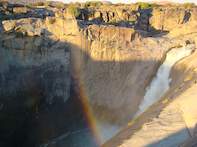
Augrabies Falls National Park is a 51 000 hectare nature reserve located in the Northern Cape Province, 120 km (74.4 miles) from Upington close to the South African and Namibian border. The park takes its name from the KhoiKhoi word 'Aukoerebis' which means 'the place of great noise' and refers to the loud crashing sound made by the water as it cascades down the rocks.
Despite it's out of the way location, the national park is a popular tourist destination and each year thousands of tourists flock to the reserve to view the huge 145 metre fall, take in the over whelming noise of the water, and watch the playful antics of the colourful Lizards basking in the sun around the falls.
The one of the main features of the nature reserve is the powerful Orange River that forms the northern border of the reserve and runs along the entire northern boundary. The yawning 18 metre long ravine that has been cut into the rocks by the water and runs from the falls westwards forms the second major feature of the landscapeand of course; lastly, there is the massive 145 metre waterfall, of which the final 56 metres are an impressive sheer drop over an eroded granite cliff.
Colonisers arrive in the area
The history of human life in the reserve area stretches throughout all three Stone Ages as indicated by stone tools that have been found here. The KhoiKhoi migrated to the area about 2 000 years ago, bringing with them domestic livestock. The first white settler to record sighting the falls was Hendrik Wikar in 1778 and later other explorers write about the falls, recording seeing Elephant, Giraffe, Kudu, Rhino and other African game animals around the water as well as Hippopotami in the river.
What Wildlife can you see in the park?
Today visitors should not expect to find abundant game animals in the safari park section of the reserve; but they may be lucky enough to spot a number of antelope including; Springbok, Gemsbok and Common Eland while out on a self-guided game drive.
Hartman's Mountain Zebra and Giraffe can also be seen. Klipspringer can often be spotted in the rocky areas and the reserve is considered to be one of the best locations to view these agile mammals as they skip along the rocks and boulders.
Visitors staying in the rest camp should be aware of the Vervet Monkeys and Savanna Baboons that are found in the area as they have been known to snatch food off of tables and can cause a lot of damage if they gain access to the chalets.
There are 17 types of carnivores found within the reserve, including Leopards, Brown Hyaena, Suricate, Small-spotted Genet and Black-jacked Jackals, but many of them are seldom seen.
Birding in the Augrabies region
The rest camp and surrounding area offer excellent bird-watching opportunities and the national park is considered a popular bird-watching destination despite the aridity. Of the 216 species of birds found here, bird-watchers may be lucky enough to spot Pied Barbet, Namaqua Warbler, Pririt Batis, Dusky Sunbird, Short-toed Rock Thrush amongst others, all within the camp area itself. African Fish Eagles are often seen along the river banks and Verreaux's Eagles can be seen hunting for Dassies in the nearby hilly areas.
Land of colourful lizards
Many of the 45 species of reptiles found in the nature reserve are secretive and seldom seen, but along the rim of the gorge and on the rocks above the falls visitors can look forward to seeing Broadley's Flat-Lizard with the brightly coloured males being easier to spot than the plain females.
Spend some time observing these small Lizards and you might be rewarded with a playful show as they spring upinto mid-air, catching the small blackflies that swarm around, or dash suddenly to snatch up a ripe Namaqua rock-fig as it falls from a tree.
Another Lizard that tourists may see is the Southern Rock Agama, with its distinctive blue head, seeking out vantage points from which to ward off rivals by bobbing their heads up and down. Large Nile and Monitor Lizards are also found in the reserve and can be seen wandering into the water along the riverbank near the camp. Puff Adders, Cape Cobras and Black Spitting Cobras are all found in the safari park and if seen should be left alone and given a wide birth.

 The enigmatic and alluring Augrabies Falls National Park is situated just west of the town of Upington in the Northern Cape Province of Sout...
The enigmatic and alluring Augrabies Falls National Park is situated just west of the town of Upington in the Northern Cape Province of Sout... One of the most popular tourist destinations in South Africa's Northern Cape Province, the Augrabies Falls are a 145m waterfall and is a mag...
One of the most popular tourist destinations in South Africa's Northern Cape Province, the Augrabies Falls are a 145m waterfall and is a mag...